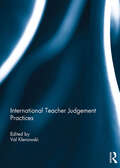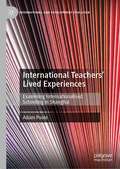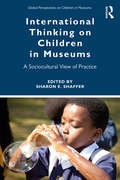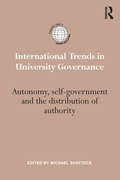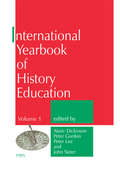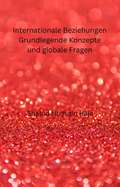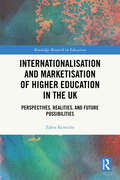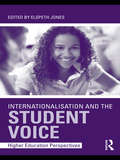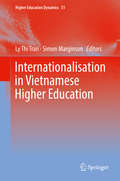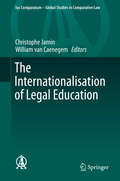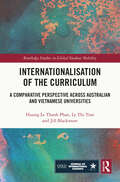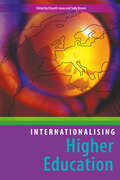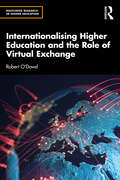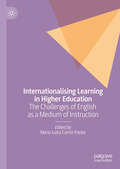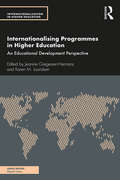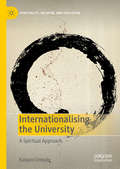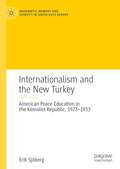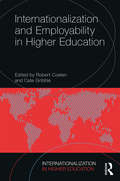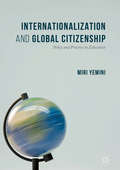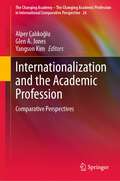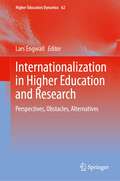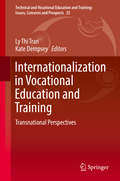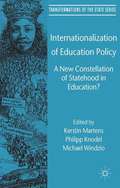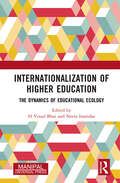- Table View
- List View
International Teacher Judgement Practices
by Val KlenowskiHuman judgements underlie all assessments regarding the quality of students’ understandings, and such judgements are conceptually complex and elusive. The study of the complexity of the judgement process is in its infancy but clearly warrants further critical investigation. However, what is demonstrated from the wide variety of international teacher judgement practices presented in this volume is that teacher judgement requires a lot more than a set of standards, criteria and annotated examples. Understandings of assessment theory by pre-service teachers through to more experienced teachers, and opportunities for all to critically reflect and consider their judgements of student work, are vital. Teachers are struggling to maintain their interpretive freedom at the local, professional level in contexts where central policies promote standardisation or ‘regulation’ of judgement practice, for accountability purposes. This book was originally published as a special issue of Assessment in Education: principles, policy & practice.
International Teachers’ Lived Experiences: Examining Internationalised Schooling in Shanghai (International and Development Education)
by Adam PooleThis book explores the emerging and under-researched phenomenon of internationalised schooling in China. It focuses on a group of “accidental” teachers who fell into teaching through happenstance or necessity, a group of teachers increasingly seeking refuge in Chinese Internationalised Schools. Chinese Internationalised Schools cater to an affluent middle class in China, offering some form of international curriculum which is taught by host country Chinese nationals and expatriate teachers. Chapters focus on three dimensions of teachers’ lived experiences of working in these schools: the intercultural, which explores teachers’ negotiations of intercultural teacher identities; the precarious, which highlights the struggles they might face at work; and the resilient, which illustrates how teachers survive—and even thrive—in the position. The author identifies a complex interplay between surviving and thriving, giving rise to the concept of “sur-thrival.”
International Thinking on Children in Museums: A Sociocultural View of Practice (Global Perspectives on Children in Museums)
by Sharon E. ShafferInternational Thinking on Children in Museums introduces current research, theory, and practice about young learners in museums around the world. The book imparts vital knowledge about the nature of childhood and children’s learning that will improve understanding of the very youngest museum-goers. Including contributions from practitioners, scholars, and consultants around the globe, this volume examines museum practices and children’s learning across a range of distinct cultural and geographic locales. The framework of the book is based on research and current thinking in the realm of developmental psychology, sociology, and anthropology, allowing the contributors to examine the evolution of early learning and children’s programs through a sociocultural lens. This broad-based look at international museum practices for children offers a rare view of the field from an important, but oft-neglected perspective: that of society and culture. International Thinking on Children in Museums will broaden understanding of museum practice across cultures and geographic regions and, as such, will be of interest to scholars and students engaged in the study of museum education, museum studies, and early learning. It should also provide a much-needed source of inspiration for museum practitioners working around the world.
International Trends in University Governance: Autonomy, self-government and the distribution of authority (International Studies in Higher Education)
by Michael ShattockGovernance is becoming increasingly important in universities just as it is in the wider world of commerce and banking. Historically, universities were run by their academic communities but as mass higher education has taken root, as university research has become a critical element in national economies and as the demand for more accountability both financial and in academic performance has grown, pressure has mounted for a ‘modernisation’ of governance structures. One aspect of ‘modernisation’, particularly important in many European systems, and in Japan, has been the decision by governments to give institutions greater autonomy, more control over their budgets and legal responsibility for the employment of their staff. International trends to introduce greater competition between institutions, to encourage greater institutional differentiation and give greater play to market forces has led to an emphasis on leadership, a more systematic involvement of external stakeholders and a more ‘corporate style of governance. At the same time this has often led to a sense of loss of collegiality, a redistribution of authority and a growing gap between the ‘centre’ and the ‘periphery’ within universities. This book analyses governance change in nine major higher education systems, Australia, Finland, France, Germany, Italy, Japan, Norway, the UK and the USA, each account being the result of independent research by a leading authority in the field and describes how a convergence of governance structures has been mediated by the historical, cultural, political and social characteristics of the different systems. Michael Shattock is a leading authority on university governance; this study offers the most up to date account of governance reform in a range of higher education systems, an analysis of the common trends and an assessment of their impact on the idea of a university. It will be essential reading for academics, postgraduates and practitioners in higher education.
International Yearbook of History Education (Woburn Education Series)
by Peter Lee John Slater Peter Gordon Alaric DickinsonFirst Published in 1996. Routledge is an imprint of Taylor & Francis, an informa company.
Internationale Beziehungen Grundlegende Konzepte und globale Fragen: Ein Handbuch
by Shahid Hussain RajaDies ist eine Sammlung von 20 langen Essays zu verschiedenen globalen Themen, die für diejenigen geschrieben wurden, die gerne wissen möchten, welche großen Themen und Ideen die Weltpolitik prägen, aber nicht die Zeit haben, im Internet nach einem umfassenden Verständnis zu suchen. Von der Globalisierung und der Syrienkrise auf der einen Seite bis hin zu Clash of Civilisation und dem Ende der Geschichte auf der anderen Seite behandeln diese Essays Themen, über die fast jeder nur rudimentär Bescheid weiß, aber nicht in der Lage ist, sie zu erklären. Terrorismus, Privatisierung, Korruption, Agrarreformen usw. sind einige der Themen, über die jeder spricht, aber nicht in der Lage ist, sie systematisch zu diskutieren. Wir haben versucht, ihm/ihr in diesen Aufsätzen genügend Material zur Verfügung zu stellen, damit er/sie dies tun kann. Einstein hat einmal gesagt: "Wenn man es einem 6-Jährigen nicht erklären kann, weiß man es selbst nicht". Nun, diese Aufsätze sind nicht für 6-Jährige gedacht, sondern für alle, die sich für globale Themen interessieren und sie aus der richtigen Perspektive betrachten wollen. Diese Aufsätze sind das Ergebnis gründlicher Recherchen und stellen in laienverständlicher Sprache die Grundlagen jedes Themas dar, wobei das Triviale beiseite gelassen wird. Angesichts der Fülle an Material, das im Internet oder in gedruckter Form verfügbar ist, stellt sich die logische Frage: "Was ist neu an diesem Buch?". Nun, nur zwei Dinge - ein leichteres Verständnis der komplexen globalen Themen und ein leichtes Einprägen der wichtigsten Punkte für die Beantwortung der Fragen in der Prüfung oder während einer Diskussion. Obwohl wir keinen Anspruch auf Originalität des Materials erheben, werden Sie doch unsere Beiträge zur Literatur zu verschiedenen behandelten Themen bemerken Übersetzt mit www.DeepL.com/Translator (kostenlose Version)
Internationalisation and Marketisation of Higher Education in the UK: Perspectives, Realities, and Future Possibilities (Routledge Research in Education)
by Zahra KemicheThis timely volume sets out the author’s novel concept of the Organic model of internationalisation, developed using participants’ perceptions, lived experiences, and recommendations for a better sustainable future of HE, and explores its broader application in the context of higher education.Using the qualitative IPA (Interpretative Phenomenological Analysis) approach, chapters showcase the lived experiences and subjective perspectives of individuals around the paradox that internationalisation presents, the distorting effects of institutional power, and the market- and ethics-based concerns of internationalisation in higher education. Drawing on an in-depth empirical study conducted using participant observation and interviews with participants from three UK universities, the book proposes a framework for redefining the global discourse of HE through the Organic model and urges the need for a compromise between profit and ethics to the benefit of both organisations and individuals. The book thoroughly discusses racist practices and introduces the concepts of “xeno-racism” and “angelism” , ensuring that the proposed approach is authentic and responsive to the diverse experiences of the student body.Showcasing a model with international potential and ramifications, this book will appeal to researchers, academics, and postgraduate students in higher education, internationalisation, and international study mobility. Practitioners and policymakers may also benefit from the volume.
Internationalisation and the Student Voice: Higher Education Perspectives
by Elspeth JonesThis groundbreaking volume seeks to take the first steps in analyzing the impact of internationalization initiatives from student perspectives. As programs are increasingly delivered overseas and we seek to offer domestic students an international experience, how do we know what works for students and what does not? Encompassing the fast-growing global imperative is a significant challenge for higher education and this collection identifies opportunities for enrichment of the learning environment, with all chapters based on direct research with students. The book provides essential reading for anyone engaged in internationalization and wishing to learn more about the impact on students of a range of initiatives in order to apply the lessons in their own contexts. Chapters include student responses to the following learning contexts: "traditional" international contexts, where students study outside their home country for shorter or longer periods; "trans-national" programs where students study at home or in another country and faculty from the awarding university fly in to deliver courses; domestic students studying in their home country, with staff seeking to internationalize the curriculum; students having transformational international experiences in other countries through service learning/volunteering, or study abroad
Internationalisation in Vietnamese Higher Education (Higher Education Dynamics #51)
by Ly Thi Tran Simon MarginsonThis book focuses on models, strengths, opportunities, constraints and tensions in internationalisation in Vietnamese higher education. It reflects on key concepts from contemporary theories and models of internationalisation and discusses the implications for innovation, flexibility and responsiveness to local needs in Vietnam. Based on empirical research, theoretical knowledge and the experiences of researchers from Vietnam and overseas, the book draws out the distinctiveness and complexity of internationalisation practices and charts a way forward. It examines the key drivers and dimensions of internationalising Vietnamese higher education, and compares internationalisation in Vietnam to that in other countries. It clarifies and discusses tensions related to the appropriation of ‘Western’ internationalisation practice and models, and neo-liberal ideologies, to the local context of Vietnam. It provides readers with insights into government policy, quality assurance and benchmarking strategies, curriculum, the impact of international organisations on higher education, international student mobility, transnational education, employability, brain drain and brain gain and brain circulation.
The Internationalisation of Legal Education
by Christophe Jamin William Van CaenegemThis volume provides an overview of thestate of internationalisation of legal education (IOLE) in many civil law andcommon law countries. It provides a picture of the status of the debate aboutthe shape and degree of internationalisation in the curriculum in the differentcountries, and the debates surrounding the adoption of a more internationalapproach to legal education in the contemporary world. It is a compilation of the NationalReports submitted for the August 2014 Congress of the IACL held at Vienna, andcontains an introductory general report. Together, the reports examine suchquestions as: Why is the topic of internationalization of legal education on theagenda now? Why is it a relevant subject for examination today? Does the topic generatethe same level of interest everywhere in the world? Is enthusiasm for IOLEmainly driven by the academic sector, by government, by multinationalcorporations? Is the interest closely linked with the globalization of thepractice of law? Or is globalisation of law itself something of a myth, or areality reserved for only a very small percentage of practising lawyers aroundthe world? The general andnational reports make clear that there is indeed widespread interest in IOLE,and numerous disparate initiatives around the world. Nonetheless, some NationalReporters state that the topic is simply not on the agenda at all. All in all,the volume shows that the approachesto internationalisation are many and varied, but every jurisdiction recognisesthe importance of introducing aspiring lawyers to a more integrated globalenvironment.
Internationalisation of the Curriculum: A Comparative Perspective across Australian and Vietnamese Universities (Routledge Studies in Global Student Mobility)
by Ly Thi Tran Jill Blackmore Huong Le Thanh PhanThis book compares the nature and practice of internationalisation of the curriculum at the policy, institutional, and classroom levels in Vietnam and Australia: the former an Asian, developing, and sending country of international students, and the latter an Anglophone, developed country, and a major education export provider.By examining curriculum internationalisation practices in these two vastly different socio-cultural contexts, the book contributes to the understanding of the magnitude and the range of differences regarding national and institutional responses to the common call for curriculum internationalisation. It addresses the impacts of the latest technological, political, economic, and sociocultural developments and COVID-19 on higher education internationalisation, as well as the digitalisation of international education. Crucially, it responds to a critical gap in the literature by not only investigating curriculum internationalisation policies and their implementation, but how faculty staff and students experience and engage with internationalisation of the curriculum in their home context, and how they position themselves and are positioned by the structural conditions with regard to curriculum internationalisation. The authors utilise document analysis, in-depth interviews, and focus groups from a four-year research project. The research employs a unique conceptual framework combining practice architectures theory and Barnett and Coate’s conceptualisation of curriculum as knowing-acting-being.Providing rich inputs for new ways of thinking and doing to enhance educational quality and the learning experiences of all students, the book is a valuable resource for researchers, academic staff, practitioners, leaders, and students in higher education and international and comparative education.
Internationalising Higher Education
by Sally Brown Elspeth JonesWith increasing numbers of international students, this book explores how best to broaden the approaches to learning and teaching in the higher/further education environment. Rather than seeing internationalization as a problem to be addressed, this text embraces the opportunities for the enrichment of the learning environment through a values-driven approach to internationalization. Taking a positive and practical approach to internationalizing higher education, the book considers a range of questions about how to bring in global perspectives to the learning environment and education provision. Packed with case studies and vignettes from around the globe, the book proposes that the international student lies at the heart of the university as a source of cultural capital and intentional diversity, enriching the learning experience, enhancing staff experience and building a more powerful learning community.
Internationalising Higher Education and the Role of Virtual Exchange (Routledge Research in Higher Education)
by Robert O'DowdThis volume introduces Virtual Exchange (VE) as an innovative form of online intercultural learning and investigates the myriad of ways VE is being carried out across universities, ultimately arguing for its integration into university internationalisation policies and course curricula. Against the backdrop of increased digitalisation initiatives throughout universities given the effects of the pandemic, chapters focus not only on providing new research findings, but also on providing a comprehensive introduction and argumentation for the use of VE in university education and also in demonstrating how it can be put into use by both university decision-makers and educators. Reviewing the limitations of the activity, this timely work also fundamentally posits how VE and blended mobility more broadly could be developed in future higher education initiatives. This book will be of interest to researchers, academics, scholars, and students involved with Open & Distance Education and eLearning, approaches to internationalisation in education, and the study of higher education more broadly. Those interested in innovative methods for teaching and learning, as well as educational research, will also benefit from this volume.
Internationalising Learning in Higher Education: The Challenges of English as a Medium of Instruction
by María Luisa Carrió-PastorThis edited book examines the use of English as a Medium of Instruction (EMI) in a variety of international higher education contexts. The internationalization of education – indicated by increasing mobility of students, staff and ideas, as well as by policies and programmes put in place to facilitate educational exchange - has led to increasing adoption of English as a Lingua Franca (ELF) for educational purposes. In this book, the authors present the results of empirical research into the implementation, assessment, development and use of EMI programmes in different settings, presenting the case for more structured training of teachers and staff. It will be of interest to second/foreign language teaching and administrative staff, as well as anyone else involved in teaching in English at higher education level.
Internationalising Programmes in Higher Education: An Educational Development Perspective (Internationalization in Higher Education Series)
by Jeanine Gregersen-HermansThis book addresses challenges that higher education institutions face when bridging the gap between internationalisation as a key university strategy and their delivery of interculturally competent and responsible graduates. Combining international case studies and research outcomes, it provides an in-depth understanding of the role educational developers can play in the internationalisation of higher education and in the provision of an internationalised learning experience for all students. The book situates international education in global and local contexts and contributes to the design and delivery of internationalised curricula in very concrete terms. In doing so, it suggests how academic staff may enhance the quality of their programmes by leveraging the opportunities of international classrooms where students have diverse academic, linguistic, and cultural backgrounds. The content of the book is therefore also foundational for continuing professional development (CPD) programmes that enhance staff competences for designing and teaching inclusive internationalised programmes and include topics such as: An international competence profile for educational developers Intercultural competence as a graduate attribute Internationalised curriculum design and delivery Intercultural group dynamics The role of languages in internationalised higher education classrooms Reflective processes for teaching and learning in the international classroom This book is essential reading and a go-to resource for any academic looking to internationalise their education programmes. It will also be of interest to those directly involved in curriculum development, learning, and teaching as well as those who have more strategic responsibilities within and beyond HEIs, or who are involved in higher education research.
Internationalising the University: A Spiritual Approach (Spirituality, Religion, and Education)
by Kalyani UnkuleThis book takes a critical look at the internationalisation of higher education and argues for the importance of grounding education in spiritual perspectives. Using spiritual traditions to review the practices, programmes, and philosophies of learning that internationalise universities, the author proposes a paradigm for internationalisation that respects other ways of knowing. This focus seeks to decolonize knowledge and promote intercultural understanding, as well as help students achieve holistic personal development while studying abroad.
Internationalism and the New Turkey: American Peace Education in the Kemalist Republic, 1923-1933 (Modernity, Memory and Identity in South-East Europe)
by Erik SjöbergThis book examines international education in Turkey after World War I. In this period, a movement for peace and international education among American educators emerged. This effort, however, had to be reconciled with the nationalist projects of new nation-states emerging from the war. In the case of the Near East that meant coming to terms with the radically nationalist modernization project of Kemal Atatürk’s Turkish Republic. Using the case of Robert College, an American educational institution in Istanbul, which aimed to foster a future local elite of a multi-ethnic and multi-religious student body, the book sheds light on the negotiation between two conceptions of modernity, as represented by American internationalist ideals and the tenets of Kemalism the Westernizing, yet deeply ethnocentric national ideology of post-1923 Turkey. Based on recently declassified archival sources, this study addresses the educational intentions and strategies for adjustment of college faculty. It also offers a rare insight into the mindset of young students attempting to make sense of what internationalism and religious, ethnic and national identity meant in the Ottoman past and in the new republican Turkey. Focusing on Robert College and the forgotten case of its dean and social studies instructor, Dr. Edgar Jacob Fisher, it addresses the little-researched field of internationalism and peace education in interwar Turkey.
Internationalization and Employability in Higher Education (Internationalization in Higher Education Series)
by Robert Coelen Cate GribbleProviding an analysis of the relationship between Internationalization and Employability in Higher Education, this book considers the perspectives of both students and employers to illustrate how to reach positive employment outcomes for all stakeholders. Through a wide range of international case studies, this book delivers some key messages, including: The articulation of the link between internationalization and employability; The need for higher education institutions to communicate the benefits of an internationalized higher education beyond the academy; The need to ensure equity of graduate outcomes through enhanced internationalization at home; The impact of immigration policy on national benefits of internationalization of higher education; International study as a route to employability for migration purposes and building knowledge-based economies. Considering the skills developed by students through mobility experiences, while exploring the need for enhanced internationalization of the curriculum at home, Internationalization and Employability in Higher Education will be a key resource for any higher education policy makers or university staff associated with careers, employment, and integrated learning. It contains important messages for employers and recruiters.
Internationalization and Global Citizenship
by Miri YeminiThis book examines the integration of the international, global, and intercultural dimensions in contemporary education systems. Yemini provides a comprehensive understanding of the process of internationalization from different angles including policy-making, curriculum implementation, media discourse, and individual agency. The book illuminates and analyzes a set of key tensions of internationalization across multiple levels of schooling and across the domains of popular discourse, policy, curriculum, pedagogy, and students' identity, by connecting or re-connecting the process of internationalization and its outcomes at individual level of global citizenship. The author uses solid empirical embedding of each of those aspects together with development of novel theoretical insights in each of the investigated domains.
Internationalization and the Academic Profession: Comparative Perspectives (The Changing Academy – The Changing Academic Profession in International Comparative Perspective #24)
by Glen A. Jones Alper Çalıkoğlu Yangson KimThis book makes a major contribution to the scholarship on internationalization in higher education by focusing on the perceptions and experiences of the academic profession in a comparative perspective. Drawing from data collected by the Academic Professions in the Knowledge-based Society (APIKS) project, the contributors to this volume are uniquely positioned to explore the impact and implications of internationalization on those who play the central role in the teaching and research functions of higher education: the professoriate. The core chapters address issues such as the roles of gender, discipline, and career stage in the international activities of academics in different countries, national differences in the perceptions and behaviors of university faculty in the internationalization of teaching, and of research within higher education systems on the perceptions and behaviors of academics. Each of these chapters draw on the existing research literature in these thematic areas as a foundation for the systematic analysis of the international APIKS dataset to illuminate and discuss key findings. This book offers a highly original and unique contribution to the study of internationalization in higher education because its editors and contributors, as participants in the APIKS project, have been able to raise and address key research questions using comparative international empirical data on the academic profession that has never before been available. Given the tremendous importance of internationalization and the global dimension of higher education, this volume offers unique, distinctive insights on the implications of internationalization for the academic profession and the very different ways in which these transformations are understood by academics both within and between systems.
Internationalization in Higher Education and Research: Perspectives, Obstacles, Alternatives (Higher Education Dynamics #62)
by Lars EngwallThis book examines the pros and cons of the internationalization of higher education institutions, which is an important feature of modern universities. It makes a significant contribution to our understanding of universities and an important input to the assessment of the internationalization of higher education institutions both for regulators and for the universities themselves. The book’s three parts focus on a number of issues associated with internationalization. The first part – Perspectives on Internationalization – provides critical reflections on internationalization, on the globally distributed European-American university and on the impact of rankings. The second part – The Obstacles to Internationalization – deals with the significance of language, challenges of mobility and environment concerns. The third part – Alternative Modes of Internationalization – discusses internationalization at home, international distance education and the establishment of international branch campuses.
Internationalization in Vocational Education and Training
by Ly Thi Tran Kate DempseyThis edited book addresses a range of aspects of internationalization in vocational education and training (VET) in different countries. It considers the impact of internationalization and student mobility on VET at the sectoral, institutional and individual levels as the sector emerges as a key tool for social and structural change in developing nations and as a flexible and entrepreneurial means of growth in developed nations. The book explores not only the effects of the neo-liberal market principle underpinning VET practices and reforms, but importantly considers internationalization as a powerful force for change in vocational education and training. As the first volume in the world that examines internationalization practices in VET, the book provides VET and international education policymakers, practitioners, researchers and educators with both conceptual knowledge and practical insights into the implementation of internationalization in VET.
The Internationalization of East Asian Higher Education: Globalization’s Impact (International and Development Education)
by John D. Palmer Amy Roberts Young Ha Cho Gregory S. ChingDevelops new and intriguing insights into globalization theory and internationalization practice, expanding the investigation of East Asian values and contexts in comparison and separate from Western-dominant thoughts of globalization and internationalization in higher education.
Internationalization of Education Policy
by Kerstin Martens Philipp Knodel Michael WindzioThis book investigates and discusses the phenomenon of internationalization of education policy and its consequences for national policymaking processes. By comparing educational outcomes and actors' reactions in different countries, it provides detailed insights into a highly contested policy field.
Internationalization of Higher Education: The Dynamics of Educational Ecology
by H Vinod Bhat Neeta InamdarMobility of scholars for seeking knowledge has existed since the earliest ideal of universities. These universities have played a pivotal role in the movement of people across borders and the resultant transformation of societies due to transcultural interactions. Drawing on Neil Postman’s idea of media ecology, this book introduces the notion of educational ecology and discusses the evolving landscape associated with it. It compiles the expectations, best practices and experiences within the field of internationalization to discuss the interconnectedness of higher education institutions in today’s world and their implications on the educational ecology.Print edition not for sale in South Asia (India, Sri Lanka, Nepal, Bangladesh, Pakistan and Bhutan)
